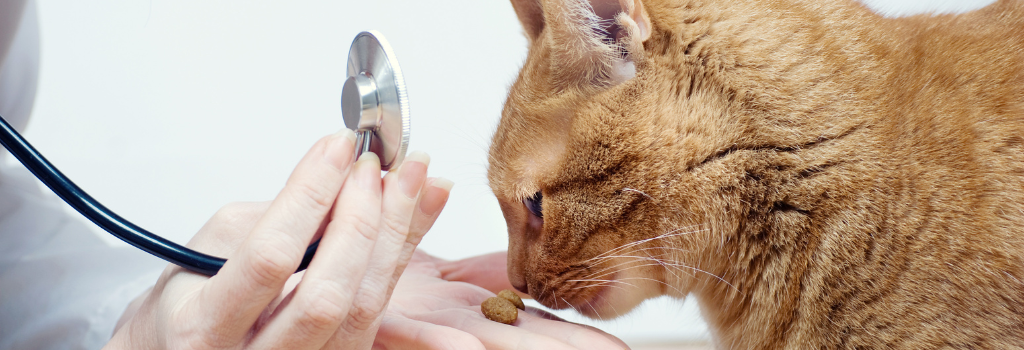Cats are very stoic creatures. By the time your cat is hiding or showing other signs that something is wrong, the disease is usually advanced. Your cat has likely been suffering for a while, and your vet bill will be bigger than if we’d caught the issue earlier. If you’re doing your due diligence on preventive care for your cat, we’re glad you found us! At Miller Place Animal Hospital, we work hard to bring you facts that you can trust. To avoid possibly disastrous misinformation you can get from Dr. Google, we’ve taken FAQs about cat preventive care and answered them to the best of our ability.
If you’re looking for a highly trained veterinarian in Miller Place, NY, we’d love to get your cat on the path to optimal wellness with a thorough preventive care regimen, so please call us at (631) 744-2050.
What is considered preventive care for my cat?
Preventive care for your cat is about being preemptive about general health, and that ranges from their diet to enrichment and even toys, bedding, and housing. It also expands here into the veterinary clinic for vaccines and annual wellness exams (more often for kittens and seniors) for your cat to make sure that everything looks healthy. With preventive care, we’re setting your cat up to live as healthily as possible for as long as possible. Again, cats are known for being stoic creatures, so if you wait until they show signs that something is wrong, the disease has often progressed too far to treat it effectively.
Some of the facets of preventive care for cats are as follows:
- Proper nutrition
- Good hygiene and grooming
- Adequate cognitive stimulation
- Ongoing health and wellness exams with blood and urine analysis
- Vaccinations
- Dental health
- Internal and external parasite control
- Behavior modification if necessary
How can preventive care extend my cat’s life and improve their health?
When it comes to veterinary health and careful monitoring of their home life, the most proactive owners have pets that tend to live the longest. And so you want to ensure you're on top of everything—the cat’s vaccines, preventions, diet, and what you’re providing for them at home in terms of enrichment. All of this makes a significant impact on their overall health and lifespan.
What types of preventive care do you recommend?
We like to see kittens about every three weeks, starting at about six weeks old. We do general checks on them. We test them for things like the feline immunodeficiency virus (FIV) and feline leukemia virus (FeLV) to ensure they don't have those. And we get them started on their vaccine series that we do about every three weeks until they are four months of age. We’re trying to to establish a healthy immune system that will protect them from diseases after they no longer have immunity from their mother’s milk. Vaccinations help prevent and fight various serious, even potentially fatal diseases that cats are at risk of contracting. They also help prevent the spread of diseases between felines, as well as to human beings.
Once kittens get through the initial four-month stage, we don't see them back for their spay and neuter until about six to eight months. And the reason why we like to recommend that, especially if your cat's going outside, is it helps with population control. Spaying and neutering cats also help prevent cancer development in those reproductive organs later in life, whether it be mammary cancer, ovarian cancer, or testicular cancer. If we could go ahead and spay or neuter cats at a younger age, we would significantly reduce the chances of developing those cancers later on in life.
We also like to get younger cats and kittens started on parasite prevention. Some products are all-in-one in that they prevent fleas, ticks, intestinal parasites, and ear mites. Fleas can cause severe skin irritation and infest your home if you do not have a good preventive plan. While less common than fleas, ticks can transmit dangerous and even deadly diseases. Both indoor and outdoor cats are at risk for fleas and ticks, as these parasites can thrive in nearly all geographic locations. That’s why flea and tick control is such a pivotal part of any preventive care program for cats. Your veterinarian reassesses their flea and tick control products yearly to ensure they are safe and effective. They will work with you to find the safest and most effective product for your cat based on lifestyle.
One part of feline preventive care that people often forget about is bathing and grooming because we all know that cats are fastidious groomers. Through self-grooming, a cat can manage their own skin, fur, and digestive health. However, what many cat owners don’t realize is there are things you can and should do as a cat owner to ensure optimal hygiene.

A simple grooming preventive care regimen for your cat includes:
- Brushing your cat's hair regularly to limit knots and furballs (especially if you have a long-haired cat breed)
- Trimming your cat's claws
- Petting and playing to maintain a healthy comfort level with interaction and to enrich the cat’s senses
If you have trouble doing any of these things, reach out to your veterinarian for advice. Also, remember to keep in mind that if a cat that is usually an excellent groomer begins not grooming or doing things like going outside the litter box, these could be indications that your cat is sick. Always err on the side of caution and contact your veterinarian.
Annual wellness exams are also critical to your cat’s health and likely the most essential part of preventive care. During these exams, we get their vaccines up to date, make sure everything looks good, their bellies feel good, and their teeth and gums look healthy. And usually, starting around age three, we begin running some general lab or blood work to ensure that everything internally looks okay. Because as we know, as any pet ages, they can develop some things like kidney or liver disease, or maybe some things are going on with their thyroid, and we want to make sure that we're keeping them happy and healthy for as long as possible.
Another part of preventive care that people might not realize is such a critical facet of a good regimen is cat nutrition. Raising a healthy cat depends heavily on the type and amount of food they consume on a daily basis. Low-quality cat food and treats high in fat or carbohydrates can negatively affect many aspects of your cats health. Feline obesity is the most common health problem we see in our otherwise healthy cat patients. Developing a nutritional plan from the kitten stage that includes a diet selection, a feeding plan, and an exercise plan is the best way to avoid feline obesity. Cats will have different nutritional requirements during each stage of their lives which include:
- Kittens
- Adult Cats
- Senior cats
- In addition, there are health conditions that require special diets
Your veterinarian will consider lifestyle and your cat’s current condition when helping you to tailor your cat’s diet—including prescribed feeding frequency and serving size. In general, we recommend high-quality canned food as the primary source of nutrition. However, some kibble in the diet may be fine. Most cats will overeat if you allow them to free feed, which is why you need to be in charge of feeding them the proper amount and then picking it up when they are finished.
Last but certainly not least is cat dental care, which is often the most neglected part of preventive care in felines. Again, cats do not tell you when they have oral pain or discomfort. And by four years of age, most cats have developed some dental or gingival disease that will require veterinary intervention. We also need anesthesia and dental x-rays to do a thorough exam on your cat, as most dental disease in cats lies underneath the gum line. X-rays can show us the root of the cat’s tooth, which is often where the issues are that cause the cat pain.
Some of the causes of dental disease and discomfort in cats include:
- Periodontal Disease
- Gum Disease
- Tooth Loss
- Mouth Sores and Ulcers
- Gingivitis
- Malocclusion
While an ultra-thorough cleaning of your cat’s teeth is something you should trust with your veterinarian, you can also regularly brush them at home too. Many cats will tolerate daily teeth brushing if you are gentle, and your veterinarian would be happy to share some tips on how to do so. You can also help facilitate excellent cat health by following the steps for excellent cat dental care and providing toys and treats formulated to help strengthen and/or clean your cat's teeth and gums.
What other possible conditions can be avoided with cat preventative care?
Cats can develop things like feline leukemia if they’re not vaccinated before being exposed. Sometimes cats with feline leukemia get sick, and they don't always make it. If your cat goes outside, we need to keep them up on their intestinal parasite deworming because if they do get these worms, they're giving up some of those valuable nutrients, and it can cause severe GI symptoms and weight loss.
Why is it important to avoid self-diagnosing my cat?
Cats are unique little creatures, and, as veterinarians, we kind of learn this art of reading cats and interpreting what they're telling us. Cats aren't just little dogs—there's a whole slew of things that are significant and special to cats. Many things can be misdiagnosed or may be misleading, especially if you’re comparing symptoms to other pets, such as dogs. If you suspect something may be wrong with your cat, go with your gut and call your veterinarian. Turning to Dr. Google can delay treatment that can prevent your cat from unnecessary suffering.
What are the risks of failing to provide preventative care for my cat?
The main risk in a lack of preventive care for your cat is the possibility of disease contraction—picking up parasites, both internal and external. And then, we can run the risk of a cat developing something like diabetes later in life, and if it goes undiagnosed, that can be detrimental to any pet. If your veterinarian had caught the diabetes early on in the cat’s life through an annual wellness exam during which we do bloodwork, you could have even improved your cat’s prognosis by simple changes in their diet.
The AVMA and AAHA have also released joint guidelines on feline preventive care you can refer to for further information. If you live in or near Miller Place, NY, we’d love to see your cat to get them on a thorough preventive care plan that you can give you peace of mind, so please don’t hesitate to call us at (631) 744-2050 or email us at [email protected].



